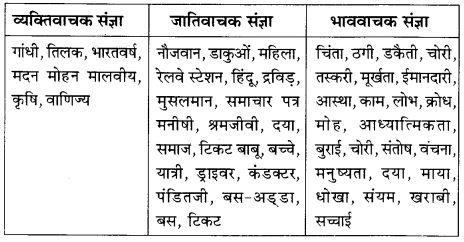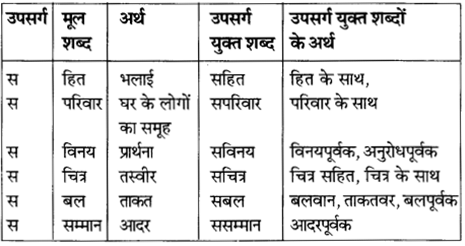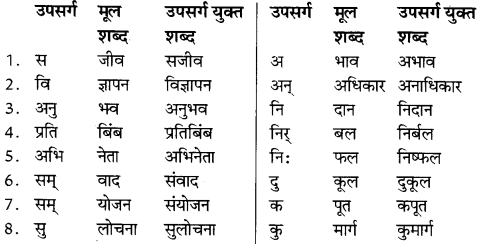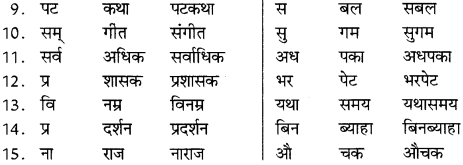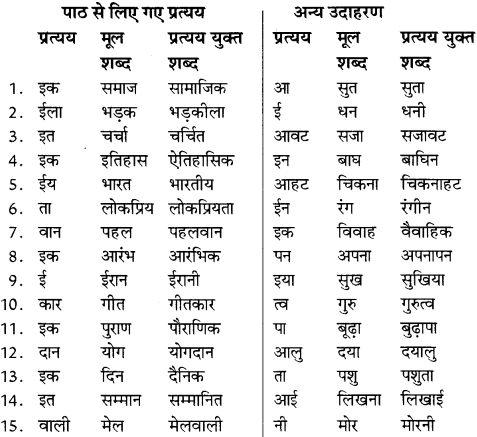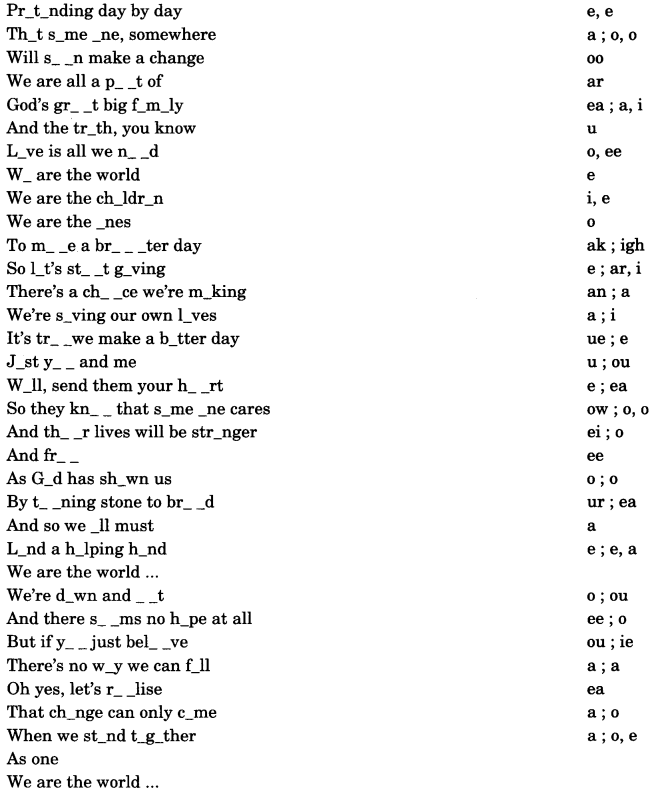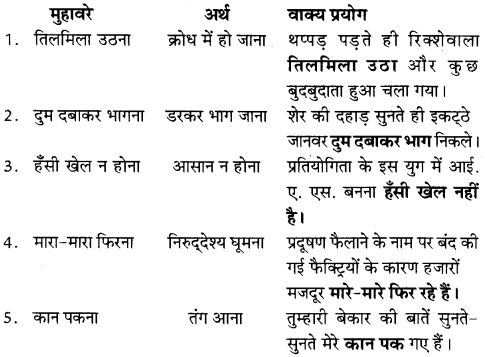NCERT Solutions for Class 8 Hindi Vasant Chapter 15 सूर के पद are part of NCERT Solutions for Class 8 Hindi. Here we have given NCERT Solutions for Class 8 Hindi Vasant Chapter 15 सूर के पद.
| Board | CBSE |
| Textbook | NCERT |
| Class | Class 8 |
| Subject | Hindi Vasant |
| Chapter | Chapter 15 |
| Chapter Name | सूर के पद |
| Number of Questions Solved | 12 |
| Category | NCERT Solutions |
NCERT Solutions for Class 8 Hindi Vasant Chapter 15 सूर के पद
प्रश्न-अभ्यास
(पाठ्यपुस्तक से)
पदों से
प्रश्न 1. बालक श्रीकृष्ण किस लोभ के कारण दूध पीने के लिए तैयार हुए?
उत्तर :
माता यशोदा कृष्ण से बार-बार कहती थी कि दूध पीने से तुम्हारी चोटी बलराम की चोटी की तरह लंबी, बड़ी और मोटी हो जाएगीकृष्ण अपनी चोटी को बड़ी होते देखना चाहते थे, इसी लोभ के कारण वे दूध पीने को तैयार हो गए थे
प्रश्न 2. श्रीकृष्ण अपनी चोटी के विषय में क्या-क्या सोच रहे थे?
उत्तर :
श्रीकृष्ण अपनी चोटी के बारे में सोचते थे कि बार-बार लगातार दूध पीने पर भी यह छोटी ही रह गई हैदूध पीते रहने से यह मोटी और लंबी हो जाएगीबार-बार बालों में कंघी करने गूथने आदि से यह बड़ी हो जाएगी
प्रश्न 3. दूध की तुलना में श्रीकृष्ण कौन-से खाद्य पदार्थ को अधिक पसंद करते हैं?
उत्तर :
दूध की तुलना में श्रीकृष्ण माखन और रोटी अधिक पसंद करते थे
प्रश्न 4. ‘तें ही पूत अनोखौ जायौ’ – पंक्तियों में ग्वालन के मन के कौन-से भाव मुखरित हो रहे हैं?
उत्तर :
इस पंक्ति में गोपी के मन के अनेक भाव मुखरित हो रहे हैं
- बार-बार शिकायत करने के बाद भी यशोदा कुछ नहीं करती हैं
- यशोदा ने शायद अनोखा पुत्र जन्म दिया है, जो शरारतें करने से बाज़ नहीं आता है
- वह मक्खन, दूध-दही आदि जमीन पर बिखरा देता है।
- अपनी शरारतों में वह अपने साथियों को भी शामिल कर लेता है
प्रश्न 5. मक्खन चुराते और खाते समय श्रीकृष्ण थोड़ा-सा मक्खन बिखरा क्यों देते हैं?
उत्तर :
मक्खन चुराते और खाते समय श्रीकृष्ण थोड़ा सा मक्खन बिखरा देते थेऐसा वे जानबूझकर नहीं करते थेकृष्ण छोटे थेमक्खन चुराने की जल्दबाजी तथा साथियों को मक्खन देते समय ऐसा हो जाता था
प्रश्न 6. दोनों पदों में से आपको कौन-सा पद अधिक अच्छा लगा और क्यों?
उत्तर :
दोनों पदों में मुझे दूसरा पद अधिक अच्छा लगा क्योंकि कृष्ण अपनी बालसुलभ आदतों के कारण माखन की चोरी करते हैं तथा गोपिका उनकी शिकायत माता यशोदा से करती है तथा अंत में कह देती है कि ‘तै ही पूत अनोखौ जायौ’ उसका यह कथन अत्यंत प्रासंगिक बन गया है
अनुमान और कल्पना
प्रश्न 1. दूसरे पद को पढ़कर बताइए कि आपके अनुसार उस समय श्रीकष्ण की उम्र क्या रही होगी?
उत्तर :
दूसरे पद को पढ़ने से ज्ञात होता है कि उस समय कृष्ण की उम्र आठ-नौ वर्ष के करीब होगीऊखल की सहायता से छींके तक पहुँचना, दही, मक्खन आदि जमीन पर बिखराना, साथियों को खिलाना आदि के माध्यम से उनके उम्र का अनुमान लगता है।
प्रश्न 2. ऐसा हुआ हो कभी कि माँ के मना करने पर भी घर में उपलब्ध किसी स्वादिष्ट वस्तु को आपने चुपके-चुपके थोड़ा-बहुत खा लिया हो और चोरी पकड़े जाने पर कोई बहाना भी बनाया होअपनी आपबीती की तुलना श्रीकृष्ण की बाल लीला से कीजिए
उत्तर :
मुझे चॉकलेट खाना बहुत पसंद हैमेरे चचेरे भाई का जन्मदिन थाउसी की तैयारी के लिए सामान लाया जा रहा थामाँ ने फ्रिज में दूध रखने के लिए मुझसे कहा, पर यह भी कह दिया कि उसमें रखी चॉकलेट हम सभी शाम को खाएँगेयह जन्मदिन के अवसर पर सभी में बाँटी जाएगीउस समय तो मैं दूध रखकर आ गया, पर मेरा सारा ध्यान उन्हीं चॉकलेटों में लगा थादोपहर में मम्मी की आँख लग गई और मुझे मौका मिल गयामैंने तीन चॉकलेट निकाल लिए और खाकर उनका कागज बाहर फेंक आया पर पता नहीं एक टुकड़ा कैसे जेब में रह गयामाँ ने शाम को जब चॉकलेट कम मिले तो उन्होंने सबसे पहले मेरी जेब टटोलीउनके हाथ वह कागज लग गया और मेरी चोरी पकड़ी गईमैंने बताया कि यह तो कल की खाई चॉकलेट का कागज है पर मेरा बहाना काम न आयामुझे पापा की डाँट खानी पड़ी
प्रश्न 3. किसी ऐसी घटना के विषय में लिखिए जब किसी ने आपकी शिकायत की हो और फिर आपके किसी अभिभावक (माता-पिता, बड़ा भाई-बहिन इत्यादि) ने आपसे उत्तर माँगा हो
उत्तर :
मेरे माता-पिता अभी मोटर साइकिल को हाथ लगाने से मना करते हैं, जबकि
मेरे मित्र को तथा मुझे मोटर साइकिल तेज चलाना पसंद हैएक रविवार को मैं उसकी मोटर साइकिल पर उसे बिठाकर जा रहा थामैंने अपने मित्र से कहा कि अभी उस मोटर साइकिल का ओवरटेक करता हूँ, कह कर मैंने स्पीड बढ़ा दीमैंने वह मोटर साइकिल ओवरटेक कर दी पर थोड़ी ही दूर जाने पर उसके चालक ने मुझे ओवरटेक करके रोका उसे देखा तो पसीना आ गया, क्योंकि यह तो पापा के मित्र थेउन्होंने यह बात पापा को बताईशाम
को घर पर डाँट पड़ीमैंने भविष्य में ऐसा न करने का वायदा किया
भाषा की बात
प्रश्न 1. श्रीकृष्ण गोपियों को माखन चुरा-चुराकर खाते थे इसलिए उन्हें माखन चुराने वाला भी कहा गया हैइसके लिए एक शब्द दीजिए
उत्तर :
माखन चोर।
प्रश्न 2. श्रीकृष्ण के लिए पाँच पर्यायवाची शब्द लिखिए
उत्तर :
श्रीकृष्ण के लिए पाँच पर्यायवाची शब्द – श्याम, गोपाल, गिरधर, मुरलीधर, वंशीधर, कान्हा, मोहन, माखनचोर।
प्रश्न 3. कुछ शब्द परस्पर मिलते-जुलते अर्थवाले होते हैं, उन्हें पर्यायवाची कहते हैं। और कुछ विपरीत अर्थवाले भी । समानार्थी शब्द पर्यायवाची कहे जाते हैं और विपरीतार्थक शब्द विलोम; जैसे –
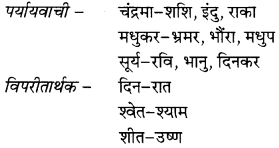
पाठों से दोनों प्रकार के शब्दों को खोजकर लिखिए।
उत्तर :
‘सूरदास के पद’ पाठ से दोनों प्रकार के कुछ शब्द नीचे दिए जा रहे हैं –
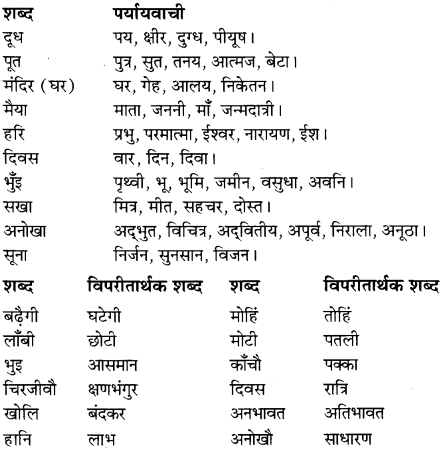
We hope the NCERT Solutions for Class 8 Hindi Vasant Chapter 15 सूर के पद help you. If you have any query regarding NCERT Solutions for Class 8 Hindi Vasant Chapter 15 सूर के पद, drop a comment below and we will get back to you at the earliest.
